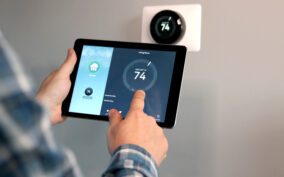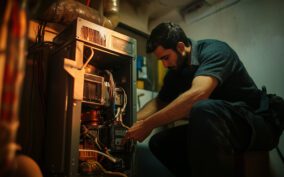Aug 11 2025
What Are the Most Common Water Heater Problems?
Water heaters are essential for keeping our homes comfortable and functional. From hot showers to clean dishes, having a reliable water heater is something we often take for granted until something goes wrong. Luckily, if you know what to look for, you can often tackle these issues early or get them resolved by professionals quickly.
With over 50 years of experience at Van Drunen Heating & Air Conditioning, we’ve handled every kind of water heater issue imaginable. Our skilled team has seen it all—and fixed it all. To help you stay ahead of potential problems, here’s a rundown of the most common water heater issues we’ve encountered over the years.
1. No Hot Water? Here’s Why It Happens
Causes:
Few moments are as frustrating as expecting a hot shower and being met with cold water instead. A lack of hot water can stem from:
- Electric water heaters: A tripped breaker, a faulty thermostat, or a malfunctioning heating element may be to blame.
- Gas water heaters: Common culprits include an extinguished pilot light, gas supply issues, or problems with the burner.
Why It’s a Problem:
Not having hot water isn’t just inconvenient; it disrupts daily activities like bathing, dishwashing, and laundry.
Solutions:
- Electric models:
- Check your circuit breaker and reset it if it has tripped.
- Test and replace the thermostat or heating element with the help of a professional.
- Gas models:
- Ensure the pilot light is lit. If it frequently goes out, it may be time for an inspection of the burner or gas valve.
For persistent problems, trust a licensed technician to diagnose and repair bigger issues.
2. That Awful Eggy Smell in Hot Water
Causes:
A foul smell in your hot water is often due to bacteria buildup inside the water heater tank. This is especially common if water has been sitting unused for an extended period. Another potential culprit is the interaction between sulfur and the heater’s anode rod, which creates hydrogen sulfide gas.
Why It’s a Problem:
Bad-smelling water affects not just showers but also cooking, cleaning, and laundry. Additionally, it’s a sign of bacterial contamination or chemical reactions that should be addressed promptly.
Solutions:
- Flush the water heater tank to remove sediment, bacteria, and old water.
- Have a professional replace the anode rod with one made of aluminum or zinc, which is less likely to cause odor issues.
- If left unresolved, persistent bacteria may require a professional tank treatment or disinfection.
3. Limescale Buildup and Its Symptoms
Causes:
Homes with hard water often have to deal with limescale, which forms when minerals like calcium and magnesium deposit onto the inside of your water heater. Heating the water accelerates this process, allowing thick layers of limescale to form over time.
Symptoms of Limescale:
- Strange noises (like popping or cracking) from the tank as it heats up.
- Rust-colored or cloudy water.
- Reduced heating efficiency, leading to higher energy bills.
Why It’s a Problem:
Limescale buildup reduces the efficiency and lifespan of your water heater. It forces the appliance to work harder, increases energy usage, and puts stress on heating elements.
Solutions:
- Flush your water heater annually to reduce buildup.
- Install a water softener to treat hard water before it enters the system.
- If your water heater is no longer functioning efficiently, it’s worth consulting a professional to descale the tank or replace damaged components.
4. Leaking Water Heater Warning Signs
Causes:
A leaking water heater can be caused by a variety of issues, including:
- Loose or damaged drain valve.
- Faulty pressure relief valve.
- Sediment buildup causing cracks along the tank’s bottom.
- Corrosion or failure of the anode rod, leaving the tank vulnerable to rust.
- Loose inlet and outlet connections.
Why It’s a Problem:
Even small water heater leaks can lead to significant water damage, higher utility bills, and mold growth if left unaddressed. Major leaks may result in a total failure of the unit.
Solutions:
- Tighten loose parts, such as the drain valve or tank connections.
- Replace a damaged pressure relief valve or anode rod.
- Flush out sediment annually to prevent cracks and corrosion.
- If leaks persist, it may be time to replace your water heater.
5. Water That’s Too Hot or Too Cold
Causes:
Water temperature issues are often caused by an incorrectly set thermostat or malfunctioning components, such as the heating element.
- If the water is too hot, the thermostat may be set too high.
- If it’s too cold, the thermostat might be faulty or set too low.
Why It’s a Problem:
Water that’s too cold disrupts daily routines, while overly hot water poses safety risks, such as burns.
Solutions:
- Adjust the thermostat to the proper setting (120–140°F is recommended for most households).
- If adjustments don’t resolve the issue, consider having a professional check and replace the thermostat or heating element.
Protect Your Water Heater with Regular Maintenance
Addressing water heater problems promptly can save time, money, and frustration. But the best way to avoid these issues altogether is through regular professional maintenance. Annual check-ups can keep your water heater running smoothly, prevent costly breakdowns, and extend its lifespan.
At Van Drunen Heating & Air Conditioning, we’re proud to bring over 50 years of expertise to each home we serve. Whether it’s maintenance, repair, or replacement, you can count on us to get the job done right.
Contact us today or request a free quote online. Let’s make sure your water heater is working just as hard as you do.




